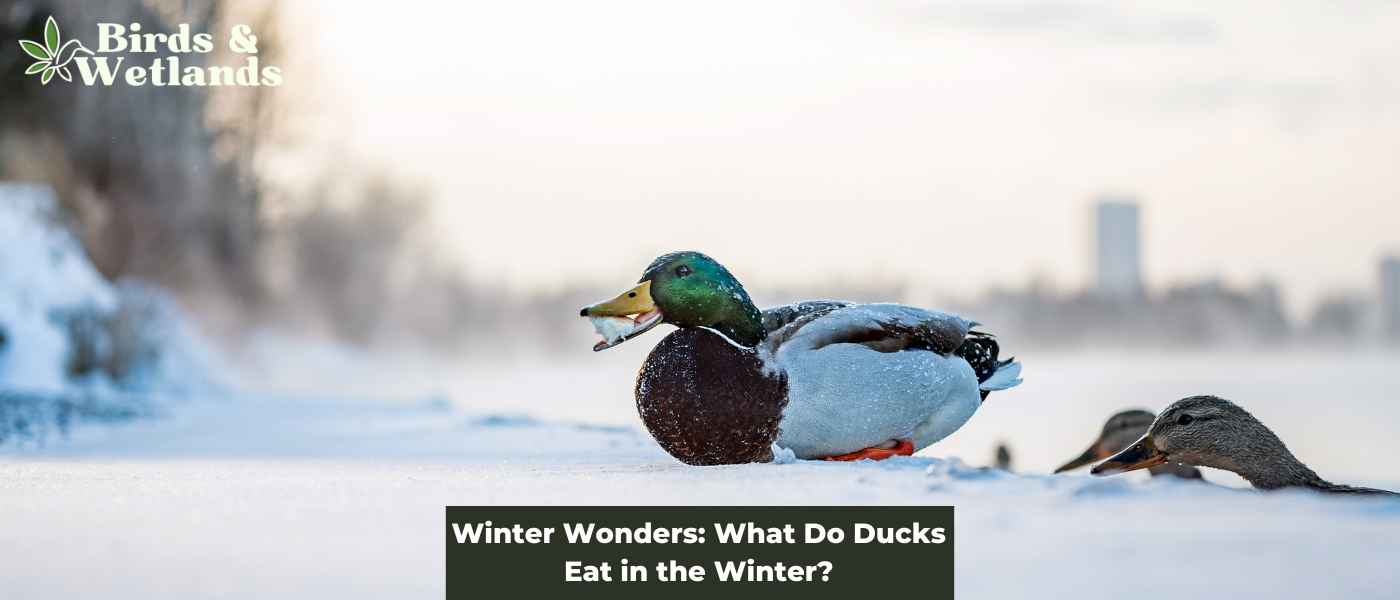In winter, ducks and other wild birds face a challenge in finding food due to the extremely cold temperatures. However, it is important to ensure that ducks are fed the right food to maintain their body temperature and keep them healthy.
So, what do ducks eat in the winter?
During winter, ducks primarily rely on their natural foraging instincts to find food sources. They consume aquatic vegetation, seeds, and small insects they can find under the ice or in the remaining open water. Ducks may also eat grains from nearby agricultural fields.
Providing supplemental food, such as cracked corn, leafy greens, and duck feed pellets, can help support their nutritional needs during this challenging season. Ensuring access to fresh, unfrozen water is also crucial for their survival.
Key takeaways
Winter poses challenges for both domestic and wild ducks as their typical food sources become scarce.
Domestic ducks usually rely on commercially prepared age-appropriate food, along with fruits and vegetables such as celery, zucchini, leafy greens, peas, corn, and non-citrus fruits.
During winter, aviculturists feed domestic ducks additional corn and greens like chard, cabbage, and kale as treats to help keep them warm.
High-energy treats like peanuts, warm oatmeal, and cracked corn can be beneficial for ducks during winter.
Wild ducks struggle in winter, often surviving on leftovers like kale, cabbage, and lettuce.
Domestic ducks require warm, well-ventilated shelters with proper insulation and temperature control to survive cold temperatures.
Ducks should have access to fresh water, but ponds and pools should be avoided as they can be dangerously cold.
Providing activities like swimming in a deep tub or playing with a cabbage head can help prevent boredom for ducks during winter.
Why It’s Important to Feed Ducks in Winter
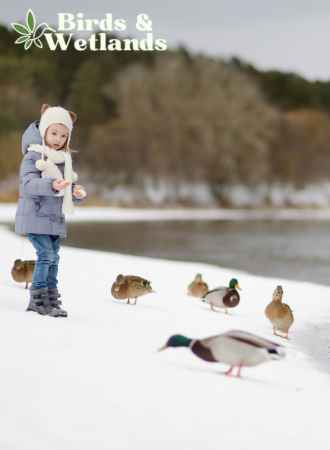
During the winter months, ducks face a number of challenges when it comes to finding food. As the temperature drops and water sources begin to freeze over, ducks have a harder time finding the insects, plants, and other food sources they rely on. This can lead to malnutrition, weakened immune systems, and even death.
Feeding ducks during the winter is crucial to their survival. By providing them with the right kind of food, you can help ensure that they have the energy and nutrients they need to stay healthy and strong. Here are some reasons why it’s important to feed ducks in winter:
1. To Help Them Stay Warm
Ducks need more energy in the winter to stay warm, and feeding them a high-quality diet can help provide the extra calories they need. This can include grains, such as wheat and corn, as well as vegetables like kale and spinach. Feeding ducks a balanced diet can help them maintain their body temperature and stay healthy throughout the winter.
2. To Boost Their Immune Systems
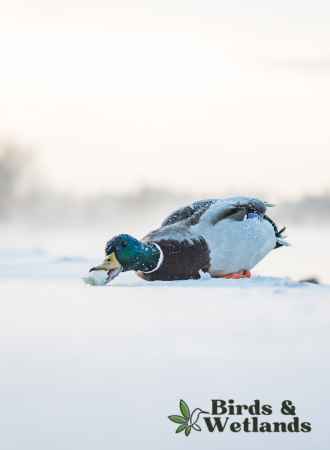
When ducks are malnourished, their immune systems are weakened, leaving them more susceptible to illness and disease. Feeding ducks a diet rich in vitamins and minerals can help boost their immune systems and keep them healthy. This can include foods like peas, carrots, and sweet potatoes, which are high in antioxidants and other nutrients.
3. To Support Their Migration
Many species of ducks migrate during the winter, and feeding them can help support their long journeys. Providing ducks with a high-energy diet can help them build up their fat reserves, which they need to fuel their migration. This can include foods like cracked corn, which is high in fat and protein.
What Do Ducks Eat in the Winter?
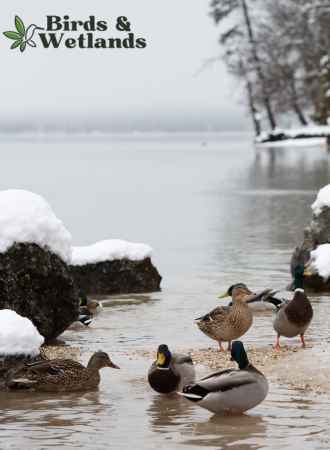
Ducks are omnivorous birds that have a varied diet consisting of both plant and animal matter. In the winter, their food sources may become scarce due to the cold weather and snow cover. This section will explore the natural and supplemental foods that ducks eat in the winter.
Natural Foods
Wild ducks primarily feed on natural foods such as aquatic plants, small fish, fish eggs, aquatic insects, snails, and other aquatic vegetation. These foods provide the necessary nutrients for the ducks to survive the winter season. Wild birds, such as mallards and mandarin ducks, also feed on amphibians, frogs, and even small fish.
In addition to aquatic vegetation, ducks also consume grains and seeds such as wheat, rice, and peas. They also eat lettuce and cabbage, which are rich in vitamins and minerals.
Supplemental Foods
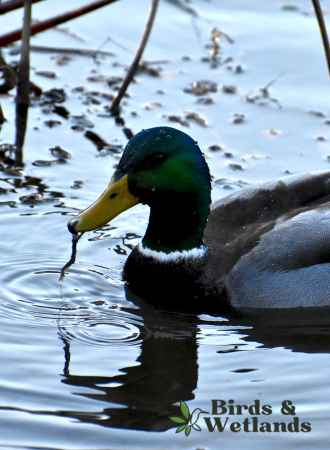
Feeding ducks in the winter can be challenging, as their natural food sources may become scarce. Supplemental feeding can help provide ducks with the necessary nutrients to survive the winter season.
Supplemental foods for ducks in the winter include small pieces of bread, cracked corn, and other grains. It is important to note that bread should only be fed in small quantities, as it can lead to malnutrition and other health problems. Other supplemental foods that can be fed to ducks include birdseed, cracked sunflower seeds, and mealworms.
It is essential to provide ducks with clean water for drinking and bathing, as well as a sheltered area to protect them from the cold winter weather. Ducks should be fed in moderation, as overfeeding can lead to health problems such as obesity and malnutrition.
Alongside this ensure their duck house has proper ventilation, as adult ducks exhale significant moisture, which can lead to frostbite.
Place vents higher up for better air circulation and to ensure fresh air. To improve insulation, add an ample amount of straw to the flooring so the frozen ground does not affect the ducks.
How to Feed Ducks in the Winter
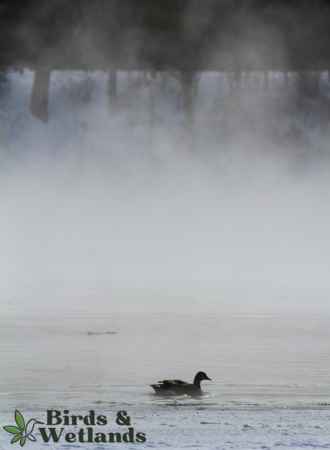
During winter, feeding ducks is important as they need extra energy to survive the cold weather. However, it is important to feed them the right foods in the right way to ensure their health and safety. Here are some tips on how to feed ducks in the winter.
Best Foods to Feed Ducks
Ducks need a balanced diet that includes protein, fat, and carbohydrates. The best foods to feed ducks or other waterfowl in city parks or local ponds in the winter include:
SEEDS
Most ducks enjoy seeds such as sunflower and pumpkin seeds.
GREENS
Ducks need fresh greens in their diet, especially in winter when they cannot forage as easily. Good greens for ducks include kale, cabbage, chard and other greens.
INSECTS
Ducks are omnivores and will eat insects and small animals as well as plant matter.
NOT BREAD
Don’t feed ducks bread or other junk food.

Black Larvae
High Nutritional Value: Rich in protein, calcium, and other essential nutrients.
Boosts Calcium Intake: With 50-75 times more calcium than mealworms

UCM Dried Mealworms
Nutrient-Dense: Packed with essential vitamins and minerals.
High Protein Content: With 53% protein,
The Risks of Feeding Ducks in Winter
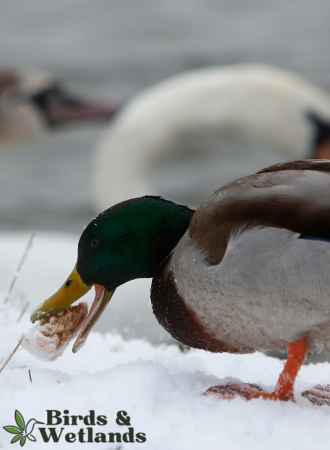
Feeding ducks in the winter can be a fun activity for families, but it can also lead to unintended consequences. Here are some risks associated with feeding ducks in the winter:
Overfeeding
Feeding ducks too much can lead to health problems for the ducks. Overfeeding can cause ducks to become overweight, which can lead to wing deformities and an inability to fly. It can also cause ducks to become malnourished if they are not eating a balanced diet. It is important to feed ducks in moderation and ensure they are eating a variety of foods.
Attracting Unwanted Pests
Feeding ducks can attract unwanted pests, such as rats and other wildlife. Leftover food can attract insects and rodents, which can lead to the spread of diseases. It is important to clean up any uneaten food and dispose of it properly to prevent attracting unwanted pests.
Harming the Ducks
Feeding ducks bread in the winter can actually be harmful to their health. Bread is not a natural food source for ducks and can lead to malnourishment. It is important to feed ducks a variety of foods, such as seeds, grains, and even small fish. Warm oatmeal can be used as an emergency food for cold ducks, but it should not be their main food source.
Feeding ducks in the winter can also disrupt their natural feeding habits and migration patterns. It is important to remember that ducks are wild animals and can survive on their own without human intervention. If you do choose to feed ducks in the winter, it is important to do so responsibly and with their health in mind.
Best Waterfowl Feed
Delightful Feeding Experience
Transform your backyard into a scenic waterfowl habitat and enjoy an interactive feeding experience with Natural Waterscapes Waterfowl Floating Food.

Pros
- Nutritious Food: Natural Waterscapes Waterfowl Floating Food is specifically designed to provide essential nutrients to waterfowl, including swans, geese, and ducks, helping them maintain a healthy diet.
- Convenient: The food comes in resealable packaging, making it easy to store and use as needed. It is also easy to handle and transport.
- Floating Formula: The floating formula of the food allows it to remain on the surface of the water, making it easier for waterfowl to eat and minimizing the risk of water contamination.
- Attracts Waterfowl: The food is formulated to attract various waterfowl species, including swans, geese, and ducks, to your pond, lake, or other water body, providing an opportunity to observe and enjoy these beautiful creatures.
- Environmentally Friendly: Natural Waterscapes Waterfowl Floating Food is made with environmentally friendly ingredients and does not contain any harmful preservatives, making it safe for both waterfowl and the environment.
Cons
- Shelf Life: The food’s shelf life may be limited compared to other types of waterfowl food due to its natural ingredients and lack of preservatives. This means you may need to use it up quickly after opening the package to prevent it from going bad.
FAQs on What do Ducks Eat in Winter
How do ducks survive in winter?
Ducks survive in winter by adapting to the cold weather through various physiological and behavioral changes. They grow additional layers of insulating feathers, increase their body fat, and huddle together for warmth. Ducks also utilize open water sources, such as rivers and lakes, that haven’t frozen over, allowing them to find food and shelter from the cold.
What is the best food to feed wild ducks?
The best food to feed wild ducks includes natural options such as cracked corn, leafy greens, and grains like oats, barley, or wheat. Feeding ducks these items is more nutritious and healthier than offering processed foods like bread, which can lead to malnutrition and other health problems. Always provide fresh, clean water when feeding wild ducks.
What temperature is too cold for ducks?
Most duck breeds can tolerate temperatures as low as 20°F (-6°C) without significant discomfort. However, extreme cold, combined with factors like wind chill, rain, or snow, can lead to hypothermia or frostbite. Providing adequate shelter, insulation, and proper nutrition can help ducks withstand colder temperatures more comfortably.

